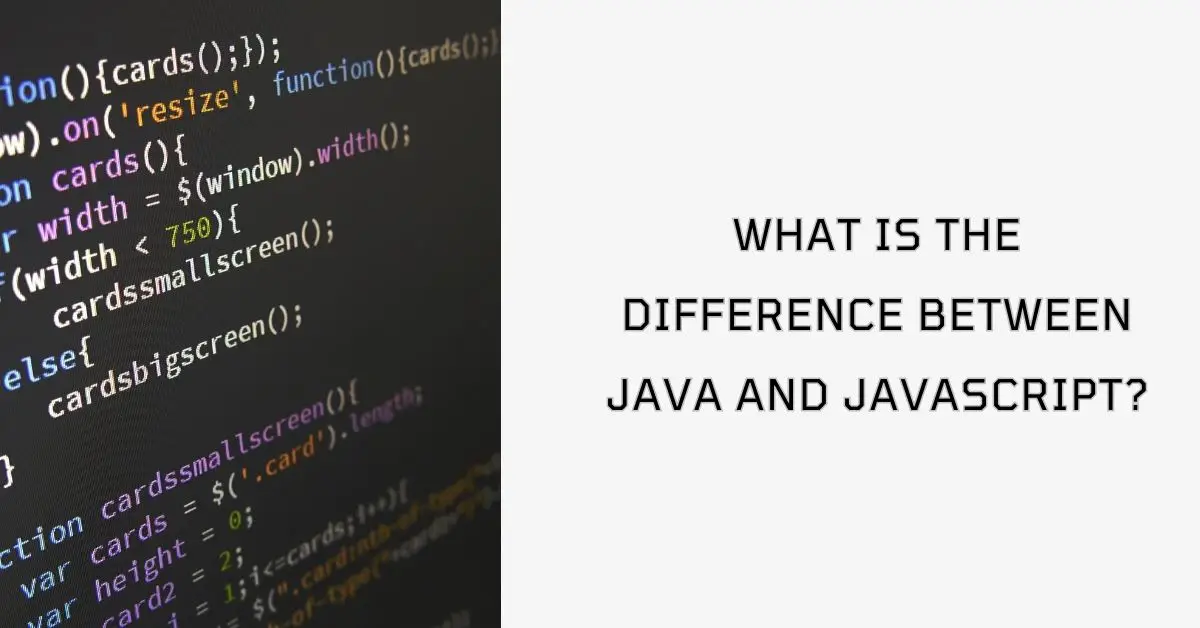Java and Javascript are two popular programming languages used for a wide range of applications. It includes web development, mobile app development, game development, and more. Despite their similar names, Java and Javascript are two distinct languages with different features, syntax, and uses. In this article, we’ll explore the differences between Java and Javascript and how they compare in terms of programming type, applications, development process, object-oriented programming, memory management, execution, and performance, as well as the similarities between them.
Overview of Java and Javascript
Sun Microsystems developed Java in the mid-1990s as a high-level, object-oriented programming language based on classes. It is designed to be portable, secure, and reliable. It makes it a popular choice for developing enterprise applications, mobile apps, and large-scale systems. Java programs are compiled into bytecode that can run on any platform with a Java Virtual Machine (JVM) installed.
On the other hand, Javascript is a lightweight, interpreted, object-oriented programming language developed by Netscape in the mid-1990s. It is mainly used for front-end web development. It adds interactivity and dynamic effects to web pages and creates browser-based applications. Javascript programs are executed by web browsers directly without the need for compilation.
Both Java and Javascript have different syntax and structures. Java uses curly braces to define blocks of code, while Javascript uses curly braces and semicolons to separate statements. Java requires explicit data typing, while Javascript uses dynamic typing. However, both languages share similar constructs such as loops, conditional statements, functions, and arrays.
What Is Vite.js & Why It Is Better Than Webpack?
What Is GraphQL: Comprehensive Guide
Jamstack: The Future of Web Development
Differences between Java and Javascript
Programming language type
Java is a statically-typed language. It means that variables and expressions have a specific data type that cannot change during runtime. On the other hand, Javascript is a dynamically-typed language. Which allows variables and expressions to be assigned different data types at runtime.
Usage and applications
Java is commonly used for developing large-scale enterprise applications, desktop and mobile applications, server-side web applications, and embedded systems. Javascript is primarily used for front-end web development. It includes web page design, animation, interactivity, and browser-based applications.
Development process and environment
Java requires a dedicated Integrated Development Environment (IDE) such as Eclipse, NetBeans, or IntelliJ IDEA, as well as a Java Development Kit. On the other hand, Javascript can be developed using a simple text editor and a web browser. There are also various code editors and frameworks available for Javascript development, such as Visual Studio Code, Atom, and React.
Object-oriented programming and prototypes
Java is a fully object-oriented programming language. It means that all code is written in terms of classes and objects. On the other hand, Javascript uses prototypes instead of classes. It allows objects to inherit properties and methods from other objects.
Memory management and garbage collection
Java uses automatic memory management and garbage collection. It means that the JVM automatically manages memory allocation and deallocation for Java programs. Javascript also uses automatic memory management, but it relies on the browser’s garbage collector to manage memory.
Execution and performance
Java programs are compiled into bytecode, which can be executed on any platform with a JVM installed. This makes Java more portable and efficient than Javascript, which is interpreted by the browser and may suffer from performance issues, especially for large-scale applications.
Libraries and frameworks
Both Java and Javascript have numerous libraries and frameworks available for different applications and purposes. Some popular Java libraries and frameworks include Spring, Hibernate, and Apache Struts, while popular Javascript libraries and frameworks include React, Angular, and Vue.js.
Similarities between Java and Javascript
Despite their differences, Java and Javascript share some similarities, including:
Syntax and structure
Both Java and Javascript use similar syntax and structure for control flow, loops, functions, and arrays. It makes it easier for developers to learn both languages.
Language constructs
Both Java and Javascript have similar language constructs such as variables, expressions, conditionals, loops, functions, and arrays, although they differ in their data types and usage.
Code reuse and modularity
Both Java and Javascript support code reuse and modularity through inheritance, interfaces, and polymorphism in Java, and prototypes, closures, and modules in Javascript.
Web development and front-end design
Both Java and Javascript are used extensively in web development and front-end design, although they have different roles and applications. Java is mainly used for server-side web development and back-end systems, while Javascript is used for both client-side and server-side web development and front-end design.
Conclusion
In conclusion, Java and Javascript are two distinct programming languages with different features, syntax, and applications. While Java is used mainly for enterprise applications and large-scale systems, Javascript is used primarily for front-end web development and browser-based applications. Understanding the differences between Java and Javascript is important for developers to choose the right language for their projects and to write efficient and effective code.
FAQs
What is Java used for?
Java is commonly used for developing enterprise applications, desktop and mobile applications, server-side web applications, and embedded systems.
What is Javascript used for?
Javascript is primarily used for front-end web development, including web page design, animation, interactivity, and browser-based applications.
Can Java and Javascript be used together?
Yes, Java and Javascript can be used together in some applications, such as developing web applications using Java on the server-side and Javascript on the client-side.
Which language is easier to learn, Java or Javascript?
This depends on the individual’s background and experience with programming. Java is generally considered more complex and requires explicit data typing, while Javascript is more flexible and dynamic.
What are some popular frameworks for Java and Javascript?
Some popular Java frameworks include Spring, Hibernate, and Apache Struts, while popular Javascript frameworks include React, Angular, and Vue.js.



